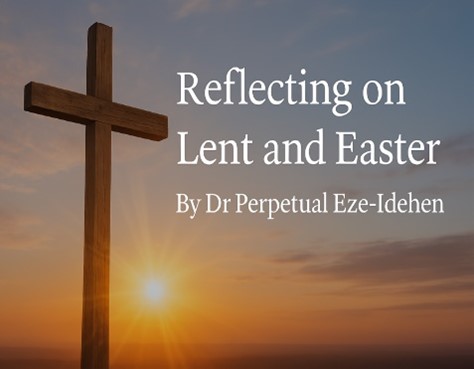
Dr Perpetual Eze-Idehen: Easter and Lent Reflection
As the seasons transition from winter’s cold embrace to the budding warmth of spring, Christians worldwide embark on a profound journey of faith, reflection, repentance, and renewal known as Lent. This ancient tradition spans the 40 days leading up to Easter Sunday, commemorating the 40 days Jesus spent fasting in the wilderness.
Spiritual practices during Lent
Lent is a time for believers to engage in spiritual practices such as prayer, fasting, and almsgiving, as they seek to deepen their relationship with God and prepare their hearts for the joyous celebration of Easter. While the observance of Lent varies among traditions, themes of penitence, self-examination, and spiritual growth remain consistent.
The word “Lent” comes from the Old English “Lencten,” meaning “springtime” – a fitting descriptor for a season of physical and spiritual renewal. For many Christians, Lent is an opportunity to “spring clean” their souls, casting off the spiritual clutter that accumulates over time and making room for God’s grace. One of the most widely recognised practices associated with Lent is fasting – a symbolic gesture of self-denial that mirrors Jesus’ 40-day fast. Traditionally, fasting involves abstaining from certain foods or luxuries to cultivate discipline and draw closer to God, such as meat or sweets. Today, others also opt for more modern forms of fasting, such as abstaining from social media or limiting screen time.
Prayer also plays a central role in Lent. Many Christians use this season to deepen their prayer life, setting aside time each day for quiet reflection, meditation, and communion with God. Some churches offer special Lenten prayer services, to deepen believers’ engagement with the season’s spiritual significance.
Finally, Lent is a time for acts of charity and service, known as almsgiving. Inspired by Jesus’ teachings on love and compassion, Christians are encouraged to reach out to those in need, offering practical assistance, financial support, or simply a listening ear. By practicing generosity and kindness, believers seek to embody the spirit of Christ and extend God’s love to all, following in the footsteps of Jesus’ ministry of love and mercy.
 Holy Week and Easter
Holy Week and Easter
As Lent draws to a close, the focus shifts to Holy Week, the final days of Jesus’ earthly ministry. Beginning with Palm Sunday, commemorating Jesus’ entry into Jerusalem, and culminating in Maundy Thursday, when he shared the Last Supper with his disciples, Holy Week is a time of profound significance for Christians worldwide.
On Good Friday, the Church remembers Jesus’ crucifixion, reflecting on the enormity of his sacrifice and the depth of his love for humanity. Through sober liturgies and moments of silence, believers enter the mystery of Christ’s suffering, contemplating the meaning of the cross and the hope it offers.
 Finally, Lent reaches its climax with the celebration of Easter Sunday, the most joyous day in the Christian calendar. Globally, believers gather to proclaim gloriously the resurrection of Jesus Christ, declaring, “He is risen!”
Finally, Lent reaches its climax with the celebration of Easter Sunday, the most joyous day in the Christian calendar. Globally, believers gather to proclaim gloriously the resurrection of Jesus Christ, declaring, “He is risen!”
Easter represents the culmination of God’s redemptive plan, as death is defeated, and new life springs forth. It is a time of jubilation, as Christians affirm their faith in the victory of light over darkness, life over death and hope over despair. Through festive worship, exuberant music, and the sharing of fellowship and food, believers express gratitude for the hope and salvation found in the risen Christ.
In reflection, Lent and Easter offer believers a sacred opportunity to draw closer to God and experience His redemptive grace. Through prayer, fasting, and almsgiving, we prepare our hearts to receive the blessings of Easter and celebrate the resurrection of Jesus Christ with joy and gratitude.

Dr Perpetual Eze-Idehen: Easter and Lent Reflection
0 Comments







0 Comments